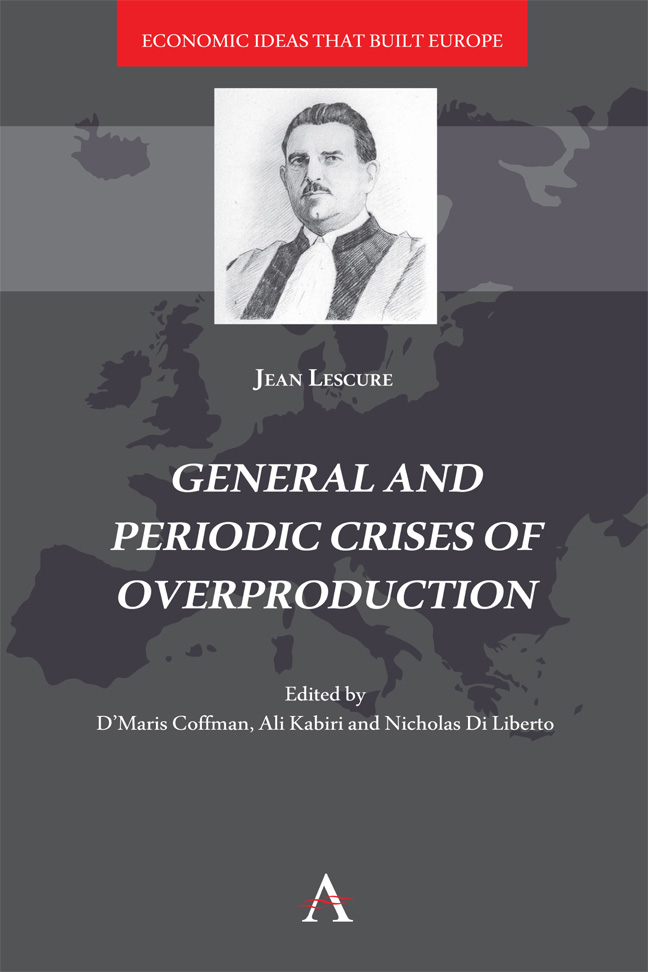Book contents
- Frontmatter
- Contents
- Acknowledgements
- Introduction: Jean Lescure on the Role of Solidarité in Industrial Economies and Among the Social Sciences
- Translator's Note
- General and Periodic Crises of Overproduction
- List of Figures
- List of Tables
- Preface to the Third Edition
- Preface to the Fourth Edition
- Preface to the Fifth Edition
- Volume One The Phenomenon
- Volume Two Causes and Remedies
- Conclusion
- Annexes
- Appendix One Bibliography of the Works Cited by Jean Lescure
- Appendix Two Bibliography of the Works of Jean Lescure
- Index
Chapter Three - Remedies for Crises
Published online by Cambridge University Press: 01 March 2024
- Frontmatter
- Contents
- Acknowledgements
- Introduction: Jean Lescure on the Role of Solidarité in Industrial Economies and Among the Social Sciences
- Translator's Note
- General and Periodic Crises of Overproduction
- List of Figures
- List of Tables
- Preface to the Third Edition
- Preface to the Fourth Edition
- Preface to the Fifth Edition
- Volume One The Phenomenon
- Volume Two Causes and Remedies
- Conclusion
- Annexes
- Appendix One Bibliography of the Works Cited by Jean Lescure
- Appendix Two Bibliography of the Works of Jean Lescure
- Index
Summary
Section One
Is the Crisis an Evil?
Before turning to an examination of the remedies for general overproduction crises, we will ask a preliminary question: Is the crisis an evil and why?
First, from an economic standpoint, economic activity is dominated by the principle of the economy of forces. The development of our modern societies through alternating periods of growth and depression results in a permanent violation of this law.
During the growth period, the increase in demand and the rise in prices allow the use of outmoded equipment and the reliance on inexperienced labour, overworked by overtime and hence less productive; so, the cost of production progressively rises. During the expansion period, more effort is expended on production than the current state of technology, the average efficiency of labour and the output of the labour force would normally have required.
The depression period is characterized by a steady decline in the cost of production, technical improvements and the elimination of producers using obsolete equipment. It appears at first glance as a period of the application of the least effort, but in fact, a large part of the equipment, even the equipment with the latest improvements, sits idle. Workers of average productivity are condemned to unemployment.
This development of our modern societies through alternating periods of expansion and depression is equivalent to a waste of energy, which has regrettable consequences from an economic perspective and above all from a social standpoint.
From a social perspective, the crisis originating from a sudden change in incomes has repercussions on all collective phenomena: moral, political and legal.
The boom period gives rise to dishonest speculation. Fortunes are quickly made. Such examples reach the regime itself. An honest merchant or industrialist will often fall victim to more unscrupulous traders. Yesterday's rich man becomes tomorrow's pauper; the crisis acts to violently eject the great capitalist of yesterday into the ranks of the middle class. The worker is condemned to unemployment, or his wages are reduced. A general social upheaval is the result. Gradually, this upheaval of purely economic origin turns into a social malaise. Crime increases. Not only does immorality increase but the legal, political and economic order itself is questioned.
From the point of view of the relations between capital and labour, the alternation of growth and depression is unfortunate. Strikes occur more frequently.
- Type
- Chapter
- Information
- General and Periodic Crises of Overproduction , pp. 427 - 473Publisher: Anthem PressPrint publication year: 2023

